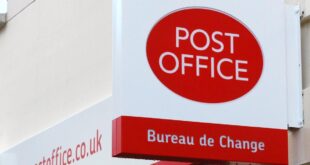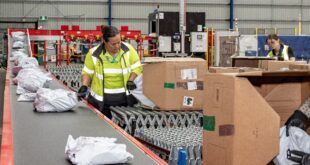Britons flocked to the High Street after for the first weekend following the lifting of the nationwide lockdown – but footfall remained lower than pre-pandemic levels.
The number of shoppers out this weekend was down 30% on the same period in 2019.
Crowds keen for a Christmas bargain flocked to shopping areas across the UK on Saturday with large numbers of shoppers photographed on London’s Regent Street and in Manchester.
Diane Wehrle, marketing director for Springboard who produced the figures, said the boost was partly down to people desperate to leave their homes after lockdown.
London’s Regent Street was rammed this weekend as shoppers flooded back to high streets on first weekend after coronavirus restrictions were eased

But figures show footfall was actually 30% lower than the same time last year, which marks another blow to the hard-hit High Street. Pictured: A man walks past a closing down sign at a store in London this weekend
‘Part of this is timing – the proximity to Christmas means there is huge pent up demand amongst consumers to shop in store to purchase gifts,’ said Diane Wehrle, Springboard’s marketing director.
‘However, it is also an indicator of ‘lockdown fatigue’, whereby after many months of being restricted to their homes, consumers are keen to visit retail stores again, particularly to experience the excitement of Christmas.’
But despite the encouraging number of shoppers, figures from market research firm Springboard showed footfall was down by 30% across the UK compared to the same December weekend last year.
On Saturday, England’s retail parks saw slightly higher footfall than this time last year, but on Sunday they fell back and were 10% below last year’s figure.

Brits headed out in their droves to high streets on Saturday to do Christmas shopping after outlets re-opened. Pictured: A shopper holds a John Lewis bag on Regent Street in London
The lower than expected footfall marks another blow to the beleagured High Street which has been hoping a pre-Christmas dash to the shops would boost their bank balances.
The compressed Christmas trading period was seen as a lifeline to many retail business owners after a tough year when the pandemic forced shops to close their doors several times in recent months.
The news comes after the High Street was hit last week by two major casualties – the collapse of retail giant Debenhams and Sir Philip Green’s Arcadia Group.
At least 26,500 jobs were hanging in the balance at both retailers as they entered crisis talks.
Sports Direct boss Mike Ashley today confirmed he is in talks with Debenhams to buy the 242-year-old department store chain.
But the head of the Fraser Group said the sale was far from guaranteed as ‘time was short’ and the recent of Topshop-owner Arcadia, which is also Debenhams’ biggest concession holder, has complicated things further.
Arcadia, which owns Topshop, Miss Selfridge, Dorothy Perkins and Burton, also tipped into administration last week, putting 13,000 jobs at risk.
Arcadia’s concessions are worth £75million-a-year in sales to Debenhams’ 124 stores – and without them the business is heading for the wall.
If the company collapses, it will add to a long list of workers who have had to let workers go in a bid to stay afloat following the pandemic.
As the government announced a second nationwide lockdown at the start of November – requiring all ‘non-essential’ retailers to close at a time when many take their greatest annual profit – High Street chains announced mass redundancies.
John Lewis cut a further 1,500 jobs, adding to the 1,300 axed when it permanently shut eight stores in July.
The retail giant was widely seen as a benchmark for High Street performance in the UK.
Lloyds Bank also announced their decision to make 1,070 more staff redundant on top of the 865 earlier in the pandemic.
Within the same 24 hours Marks & Spencer also reported its first loss in its 94 years as a listed company. The company had already cut 8,000 staff since March.
And Sainsbury’s also confirmed it would cut around 3,500 jobs across its Argos stores and supermarket meat, fish and deli counters, while Clarks shoes put the jobs of all 4,000 of its store staff on notice as part of its fight for survival.
The rescue package that was drawn up to aid the High Street giant saw the Clark family lose majority ownership of the company for the first time since it was founded nearly 200 years ago.
It also came after a tough summer for retail – within one week over the summer 651 roles were lost at Byron, 1,700 put at risk at DW Sports, 878 lost at Hays Travel and 1,100 put at risk at Pizza Express.
More than a million jobs are expected to be lost before Christmas, even before the latest lockdown was announced, taking unemployment past 2.5 million.
Analysis by the Local Data Company and Springboard suggests covid could leave up to 18,000 UK High Street shops empty as vacancies rise to the highest level since 2013.
But sales appear to be soaring online with an estimated £2.5billion spent online on Black Friday as John Lewis sales soared 35 per cent and eBay shifted two items a second.
Debit card data from Nationwide showed transactions were up 21 per cent compared to usual, a 2 per cent increase on Black Friday last year, while the Argos website saw 113 visits per second.
Source link





